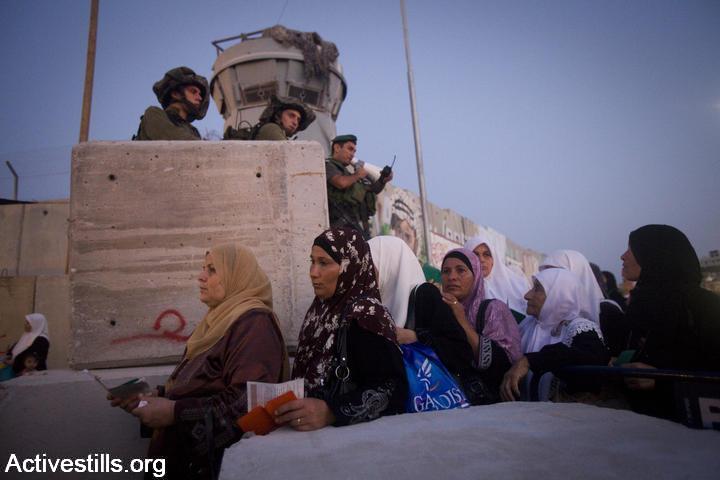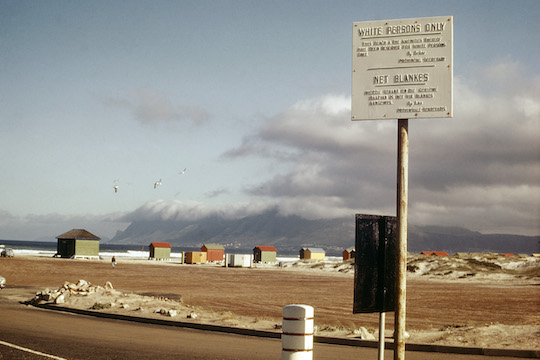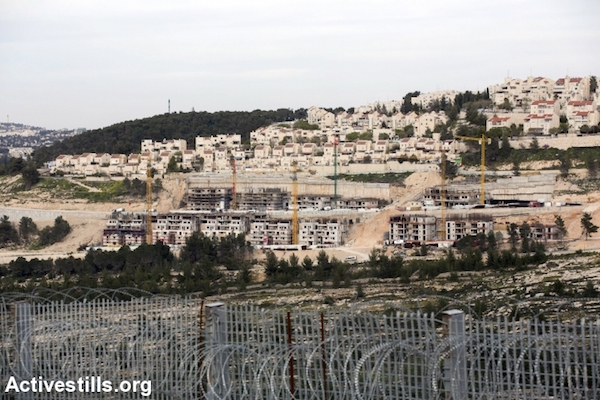‘Jewish Nation-State Law’: What It Means and Why It’s so Worrying – Apartheid Is a Process
PALESTINE - ISRAEL, 30 Jul 2018
With the passage of the ‘Jewish Nation-State Law,’ Israel has constitutionally enshrined discrimination against its Palestinian population. ‘We don’t have to keep looking for policies that resemble Jim Crow,’ says Attorney Fady Khoury.

Israeli soldiers watch Palestinian women walk towards Qalandiya checkpoint, West Bank, August 20, 2010. (Oren Ziv/Activestills.org)
19 Jul 2018 – The Israeli parliament passed the “Jewish Nation-State Law” in the early hours of Thursday morning, defining Israel as the exclusive nation-state of the Jewish people and demoting the official status of Arabic.
Almost immediately, Palestinian politicians and rights groups began speaking of the legislation in the starkest of terms. PLO Secretary General Saeb Erekat said the law “turns a ‘de-facto’ Apartheid regime into a ‘de-jure’ reality for all of historic Palestine.
Hassan Jabareen, head of the Adalah, the Legal Center for Arab Minority Rights in Israel, said the law “features key elements of apartheid” and that by passing it, Israel has “made discrimination a constitutional value and has professed its commitment to favoring Jewish supremacy as the bedrock of its institutions.”
According to Adalah attorney Fady Khoury, the legislation entrenches the identity of the State of Israel as a state for the Jewish people, turning them into the sovereign while excluding the Palestinian population from the same definition of sovereignty.
“The law itself does not mention the word democracy even once,” Khoury explained. “Psychologically, it will have a huge impact on Israelis when they are called to determine what it or isn’t democratic.”
+972 Magazine spoke with Khoury to better understand the apartheid comparison, and why the law is so problematic in general.
[The following interview has been edited for length and flow.]
People are calling this the ‘apartheid law.’ Why?
“Apartheid in South Africa was a process. It was a system that took years to develop and was built on the work of academics and theologians who had to create justifications for white supremacy. It was system of hierarchy, in which there is one group with all the power and another without any power.
“In Israel, the new law explicitly defines the Jewish people as the only group with the only right to self-determination, while negating the rights of the indigenous people. This creates a system of hierarchy and supremacy. We do not live in a time in which explicit calls for supremacy are legitimate as they were in South Africa, but we are reaching the same result through different language.

Apartheid in the Republic of South Africa. A beach for Whites only near the integrated fishing village of Kalk Bay, not far from Capetown. January 1, 1970.
(UN Photo/KM)
“The analogy between Israel and South Africa is not only about separate communities or roads, it is about a state of mind. It is about the idea of ranking different groups. It is the idea of a regime of supremacy that serves the interests of one group, even if it comes at the expense of the most basic rights of another. We don’t have to keep looking for policies that resemble Jim Crow — that mindset exists not only in the periphery of Israeli politics but also in the mainstream.”
The original wording of the bill included a clause that allowed for communities to be segregated along religious or ‘national’ lines. What does the final version say about segregation?
“The previous version of the bill included a clause that allowed the state to authorize new communities based on religion or nationality. It was based on the principle of ‘separate but equal,’ which was couched in the idea that doing so would be good for everybody — Jews or Palestinians. The language was changed since it was too close to the kind of blatant segregation we have seen in the U.S. They rewrote the clause so that the state would ‘promote Jewish settlement.’ This creates a whole different kind of paradigm for segregation, one of “separate but unequal.”

A new portion of the Separation Wall, made by a high barbed wire fence in the West Bank village of Walajeh, with at the background the growing settlement of Gilo, March 18, 2018.
(Anne Paq/Activetsills.org)
“Think about it this way: imagine if the United States passed legislation that promoted ‘white settlement’ — we would cringe. But after 70 years of a Jewish and democratic state, the idea of Jewish settlement has become so mundane that it does not seem problematic. In that sense, the change is cosmetic. But what the right wants to achieve is the same: Judaizing the country while incentivizing building communities for Jewish citizens only.”
What are the potential effects this law could have on the legal system?
“This is a law that will determine the state’s constitutional identity. Up until now, it was the role of the Supreme Court to interpret what the phrase ‘Jewish and democratic’ really meant. Now we have a law that grants the state’s Jewish identity constitutional status.”
“[The law] will be foundational. It becomes a source of interpretation of the laws and the legal system. The ramifications are not going to be limited to a few areas: they are going to affect the legal system at the root, especially if the right continues to appoint conservative justices to the Supreme Court, which will use this new constitutional norm to interpret the law.”
Is the new law an acceleration of a process that has been taking place here recently, or does it enshrine a discriminatory regime that has always existed here?
“I think we are seeing an escalation that did not begin with the new Basic Law, but rather is a result of the contradiction between the fundamental identities of the state as Jewish and democratic. What we are seeing now is Jewish identity encroaching more and more on the social and political life of Israel’s citizens, while the ‘democratic’ identity of the state is experiencing a regression.”
______________________________________________
 Edo Konrad is a writer, blogger, and translator based in Tel Aviv. He previously worked as an editor for Haaretz, and is currently the deputy editor of +972 Magazine.
Edo Konrad is a writer, blogger, and translator based in Tel Aviv. He previously worked as an editor for Haaretz, and is currently the deputy editor of +972 Magazine.
+972 Magazine is a blog-based web magazine that is jointly owned by a group of journalists, bloggers and photographers whose goal is to provide fresh, original, on-the-ground reporting and analysis of events in Israel and Palestine. Our collective is committed to human rights and freedom of information, and we oppose the occupation. However, +972 Magazine does not represent any organization, political party or specific agenda. We see +972 as a platform for our bloggers to share analysis, reports, ideas, images and videos on their channels. Each blogger owns his or her channel and has full rights over its contents (unless otherwise stated). The bloggers alone are responsible for the content posted on their channels; the positions expressed on individual blogs reflect those of their authors, and not +972 as a whole.
Join the BDS-BOYCOTT, DIVESTMENT, SANCTIONS campaign to protest the Israeli barbaric siege of Gaza, illegal occupation of the Palestine nation’s territory, the apartheid wall, its inhuman and degrading treatment of the Palestinian people, and the more than 7,000 Palestinian men, women, elderly and children arbitrarily locked up in Israeli prisons.
DON’T BUY PRODUCTS WHOSE BARCODE STARTS WITH 729, which indicates that it is produced in Israel. DO YOUR PART! MAKE A DIFFERENCE!
7 2 9: BOYCOTT FOR JUSTICE!
DISCLAIMER: The statements, views and opinions expressed in pieces republished here are solely those of the authors and do not necessarily represent those of TMS. In accordance with title 17 U.S.C. section 107, this material is distributed without profit to those who have expressed a prior interest in receiving the included information for research and educational purposes. TMS has no affiliation whatsoever with the originator of this article nor is TMS endorsed or sponsored by the originator. “GO TO ORIGINAL” links are provided as a convenience to our readers and allow for verification of authenticity. However, as originating pages are often updated by their originating host sites, the versions posted may not match the versions our readers view when clicking the “GO TO ORIGINAL” links. This site contains copyrighted material the use of which has not always been specifically authorized by the copyright owner. We are making such material available in our efforts to advance understanding of environmental, political, human rights, economic, democracy, scientific, and social justice issues, etc. We believe this constitutes a ‘fair use’ of any such copyrighted material as provided for in section 107 of the US Copyright Law. In accordance with Title 17 U.S.C. Section 107, the material on this site is distributed without profit to those who have expressed a prior interest in receiving the included information for research and educational purposes. For more information go to: http://www.law.cornell.edu/uscode/17/107.shtml. If you wish to use copyrighted material from this site for purposes of your own that go beyond ‘fair use’, you must obtain permission from the copyright owner.
Read more
Click here to go to the current weekly digest or pick another article:
PALESTINE - ISRAEL: